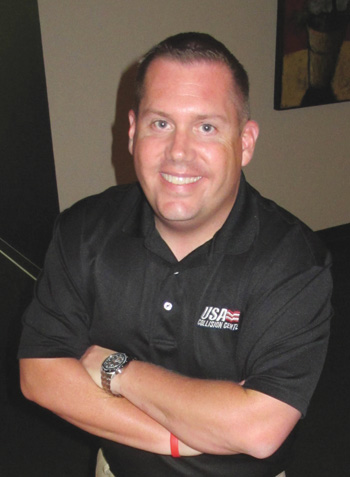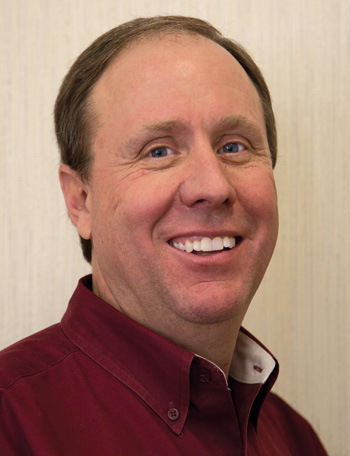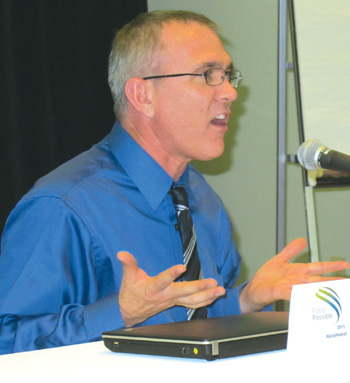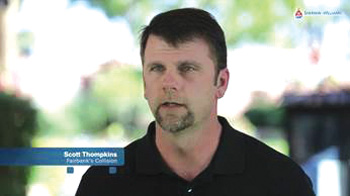 Business owners have lots to worry about. Of course, people in general have lots to worry about. It’s part of life. If you weren’t worried, it would mean you didn’t care, right? Of course, there’s the calm, rational person’s clarification: “I’m concerned, not worried.” Right!
Business owners have lots to worry about. Of course, people in general have lots to worry about. It’s part of life. If you weren’t worried, it would mean you didn’t care, right? Of course, there’s the calm, rational person’s clarification: “I’m concerned, not worried.” Right!
Collision repairers are among those business owners who especially find the going tough these days. Inadequate labor rates, intrusion into their business from outside entities, increasingly sophisticated vehicle technology and steering are just a few of the issues that no doubt keep them up at night.
Of course, we mean “keeping you up at night” in the figurative sense, but maybe these problems literally are causing you to toss and turn at night. But we thought it was important to ask various repairers what these specific issues were and what they were doing about them to take back their slumber and sleep peacefully. The answers may or may not surprise you.
 Joe Sanfilippo
Joe Sanfilippo
CEO,USA Collision, Cincinnati, Ohio
Wide Awake
What keeps me up at night is wondering where the new breed of technicians is going to come from.
I think everybody has had their own experience with younger technicians and people coming out of trade schools. We’re kind of lucky in that the median age of our techs is 35 to 36, but I look at some of the kids we try to bring in from vocational high schools and technical colleges and realize you strike out more often than not. I think, why does this happen?
And then it dawned on me. Think of who we’re going after. The kids who are in these vo-tech programs in high school don’t want to be in school. For the most part, there are only a couple who actually want to be there and look at [collision repair] as a good trade, but a lot of kids get into the program as a way to get out of normal class and earn ‘X’ amount of credits so they can get out of school. Then, they arrive at a shop and expect to make what seasoned techs are making. When they find out they have to start as an apprentice and won’t make those kinds of dollars, they seem to move on pretty quickly.
Maybe, after all these years, we’ve been going after the wrong group of people. Think of all the college kids who, after four years, are trying to stay in school because they know the job market is bleak. Why don’t we go after people with four-year degrees? I think that’s where we need to start looking for our next generation of techs and owners. Cars are not basic anymore – there is so much computer technology inside of a car, it’s mind-blowing. We really need smart people to work on cars because now it’s more than just pounding dents out, spreading a little mud and spraying paint. I think it’s fine if we go after someone who’s more disciplined and wants to better themselves and has a four-year degree. There is as much money to be made fixing cars as there is fixing computers or anything else. A tech making $100,000 isn’t unheard of if they’re good at what they do.
We need to rely on our industry associations to get in front of colleges at career fairs and educate the men and women of our future what our industry is all about. We need new shop owners. You have to have brains in order to run a business, whether it’s a McDonald’s franchise or a collision franchise.
Fast Asleep
We’ve actually been fairly successful over the past two years in taking graduates from vo-tech schools and putting them in our own apprentice programs. Because the median age of our techs is 35, we have some younger techs who are pretty smart and have done pretty well. We have a couple locations that actually have teams that are working pretty well, so we put apprentice techs into those groups. Sometimes it works really well, and sometimes you find that people figure out collision repair isn’t for them, but you won’t know till you do it. But we feel that putting them in the mix of a team or an apprentice-type program with a seasoned tech who can bring them up to speed slowly is beneficial. This program takes anywhere from one to two years depending on the strengths and abilities of that person when they come out of college.
 Todd Litton
Todd Litton
Owner, American Autobody, Billings, Mont.
Wide Awake
What keeps me up at night is the concern of making sure my technicians are successful. Our problem is that you’re either too busy or you’re not busy enough. You’re either worried about getting stuff done or having enough scheduled to keep them busy.
Is everything going to go right, you wonder. Is Johnny going to make a good paycheck? Because everyone in your business kind of becomes a big family after awhile. I’ve always felt that, in order for me to be successful, my employees first have to be successful. And that has worked pretty well for me over the years.
What has helped somewhat in our area, at least, is that our industry is growing because the population is growing due to an oil boom, so we’re seeing additional business.
If there’s something that gives me nightmares, though, it’s changes with insurance companies and the difficulty you encounter with them. When DRPs started 25 years ago and I signed my first contract, I said, ‘This is really going to be great until we reach the point when the insurance companies feel like they own you and start telling you how to run your business.’ And I think, in a lot of ways, we’ve reached that point with direct repair. Some insurers will push the envelope constantly as far as they can.
Montana has been fortunate with some of the legislation we’ve been able to get passed through our association. For example, a law was passed a couple years ago that says the insurer must use the database we chose to work together on in its entirety. So if prime and block is a separate operation, then you have to pay for prime and block. Regarding spot paint and blend within a panel, that’s not legal per the way our laws are written now. Still, it totally gets ignored because insurers always feel they’re above the law. Those are the things I think haunt every body shop owner.
Cars are getting so technical to work on with different metal types and electronics that it takes a pretty seasoned tech to keep up, and the amount of hours you get paid to perform those repairs seems to be shrinking. After 29 years in the business, I’ve noticed that body men usually always didn’t have any trouble, on a commission basis, having more hours than a painter. But in the last 10 years, it has completely turned around. The paint techs now have a way easier time making the checks than the body techs. The billable hours seem to be shrinking away in that area.
Fast Asleep
I’m on the board of directors of our state association in order to help the industry get better because that, in turn, makes everyone more successful. And that boils down to the training of estimators and everybody, so you’re truly getting everything owed for
that repair.
We’re also really involved in I-CAR to make sure our guys have the training and tools available to them to make them as successful as they can be – whether it be the latest technology in spot welders or frame equipment.
I also want to make sure they understand what they’re working on so they don’t have to learn as they go. For me on down, training is huge. I’ve been in the auto body business for 29 years and still go to SEMA and classes. And I promote that and try to have an open dialogue with local shops because I’ve always felt if you can educate your competitors, then everybody wins. Make your competitors successful and that, in turn, makes you successful. You need to keep them on the same page so they’re not bringing the
industry standards down.
 Jeff Butler
Jeff Butler
President, Haury’s Lake City Collision, Seattle, Wash.
Wide Awake
There are three things that keep me up at night: steering, where our business is going to come from in the future, and negative illegitimate online reviews.
With steering, we lose a lot of business from insurers blasting our reputation. I estimate that my shop loses $10,000 to $50,000 per month from people being chased out the door – and that’s just the people I can document.
As far as where our business is going to come from in the future, I wonder if the business model today will be viable in 10 years. There are more and more multi-shop operations (MSOs) in the marketplace and OEM certification programs, of which I have a few. But those programs tend to be political. I’ve been fortunate enough to work with really good people with whom I have good business relationships. I’m not paying people off to send me business, but that has a lot to do with some of these manufacturers’ programs. Just to get a dealer sponsor, there is stuff that you have to do to win that business, and it’s not always aboveboard. Plus, technology is changing the face of collision repair, so what will the industry look like in 10 to 20 years?
Finally, negative online reviews – especially illegitimate, negative online reviews. I do have a couple legitimate ones, and that’s because you just aren’t going to have everyone in the world thinking you’re wonderful. Nobody will ever be able to make every customer happy, even if that’s our commitment. But our shop has a bunch of negative press that isn’t real – comments from either our competitors or, in some cases, an insurance adjuster. The power of the Internet is substantial and it sways people’s decisions. And when I get slandered online, it really upsets me. Fast Asleep
To address the steering, we started taking a proactive stance and educating our customers, whether it was through handouts on insurance “frequently asked questions,” handouts about our company and what differentiates us, or our VeriFacts VQ Medallion status on the walls in our office, on our website and on our Facebook page. I’ve also conducted seminars for local car clubs to teach them about what happens in a shop and what insurance issues they might face. So I’m going right to the consumer to educate them in advance.
The other thing I’ve done to fight steering is to litigate. I’ve had cars pulled out of my shop and I’ve learned to document it. I sued four carriers for tortious interference, and I didn’t win the case in the sense that we tried it and I won it – we just knew how to bring the case and go after them for discovery and they just settled instantly and wrote a check. If an insurer induces a customer to breach their contract with us, we look to hold them accountable.
I also use bad repairs to exploit what’s going on at other shops. ‘Here’s what you’re getting at their place – here’s the proof – and here’s what you’re getting at ours. It may cost more, but that’s covered under your policy and the law. So what do you want? Do you want it right or do you want it hassle-free and get what these people got?’
To alleviate my concern about where our business is going to come from, I’ve been marketing online heavily, again conducting educational seminars for local car clubs, and pursuing manufacturer certified programs. I won’t be a DRP or CARSTAR any time soon, so I have to focus on what sets us aside. We’re a boutique shop that stays community-focused; we’re a local, family-owned business and will market directly to the consumer. We’re also trying hard to become part of dealers’ programs by selling them on our value proposition versus the insurance model. If I can sell them on the fact that we’re going to take care of the customer and put more business in their store and they’ll be better off in the long run, then that speaks to our value proposition.
As far as managing our online reputation, we realized this is a new world and every customer represents a Yelp review. So how do we up our game and deliver the kind of service that inspires them to talk about us? I can’t fix the negative reviews, but what I can do is give customers a great experience to where they start marketing our business.
When we deliver the car to them, they get a message from me thanking them for their business and asking them how our team did. They receive a follow-up survey that, if they fill out, will earn them a “buy one, get one” coupon for a local restaurant. So then I get direct feedback on my employees, and I give them bonuses based on CSI and other things. When the survey is positive, we follow up with a thank you note with links to Google, Yelp, City Search and Angie’s List and encourage them to share their experience via these commonly used online forums. We can bury the BS with good reviews!
 Scott Tompkins
Scott Tompkins
Owner, Fairbanks Collision & Glass Service, Fairbanks, Alaska
Wide Awake
PartsTrader keeps me up at night, only because I don’t know much about it. It’s not in Alaska yet, but it will be. I worry about anything that will reduce our profitability. If it works for State Farm, it’s just a matter of time before it works for everyone else. I’m very pro-DRP, but you just can’t keep taking away. Pretty soon, there won’t be anybody left in the industry to fix cars. If we can’t afford to pay our people what they need to make and their cost of living keeps going up…there’s nothing attracting new people to this industry. And that’s my second concern: where are we going to find people?
I’m a little concerned with consolidation, too. It’s a growing concern for an independent operator. Again, we don’t have it in Alaska yet, but it’s just a matter of time. I would like to be the guy who is in a position that, when consolidators do move in, I’m the guy they want to buy. But right now, I’m far from that guy and have a lot of work to do in that area.
Fast Asleep
We occasionally hire a couple people out of WyoTech, and we also have an autobody program at the local high school, but those kids are far from being ready to put on a line. I have a competitor in town who is constantly bringing me employees because turnover at their shops is insane. And when they come here, they usually stick around for a long time because we’re pretty good at retaining our employees. I know what wages are in town and I always pay a little bit more than my next highest competitor. Also, I feel our benefit package is better than any of our competitors. We help them out with health care, and we also offer a vacation package and contributing IRA. We also have a good place to work. I’m a pretty easygoing guy as long as everyone is doing their work. I don’t micromanage. I have a self- motivated crew. I don’t have a production manager because I don’t believe in them. We just hire the right people and, if we have a bad
apple, he’s out.
If consolidators move into town, I believe insurance relations will be key to protecting myself and our market. At a recent collision group meeting, they talked about “owning the customer.” I believe in great customer service, and we have strong CSI. But I feel you need to own the insurer. You can spend thousands of dollars marketing, but if you don’t have great insurance relationships, you’re not going to get the referral.













